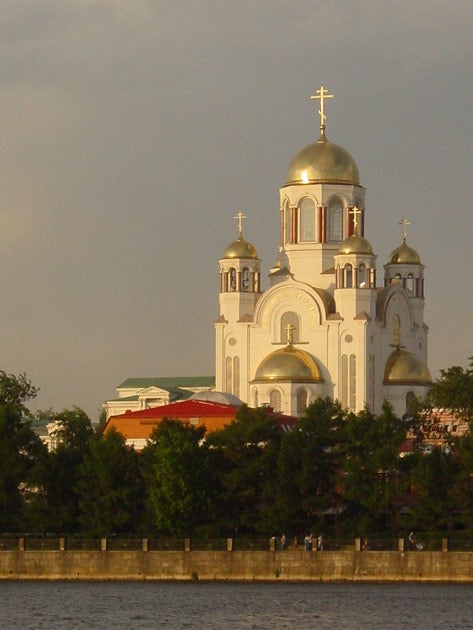Simon Calder: Russia must open up to avoid a 2018 own goal

Your support helps us to tell the story
From reproductive rights to climate change to Big Tech, The Independent is on the ground when the story is developing. Whether it's investigating the financials of Elon Musk's pro-Trump PAC or producing our latest documentary, 'The A Word', which shines a light on the American women fighting for reproductive rights, we know how important it is to parse out the facts from the messaging.
At such a critical moment in US history, we need reporters on the ground. Your donation allows us to keep sending journalists to speak to both sides of the story.
The Independent is trusted by Americans across the entire political spectrum. And unlike many other quality news outlets, we choose not to lock Americans out of our reporting and analysis with paywalls. We believe quality journalism should be available to everyone, paid for by those who can afford it.
Your support makes all the difference.Goodness, what's been going on? I spent most of the week sweltering in Suez (well, comfortable in Cairo), and returned from Egypt to find a country in gridlock. In the space of a few days, Britain's railway-excuses spectrum had shifted from "leaves on the line" to "the wrong kind of snow" .
The passengers on Wednesday night's 8.17 from London Victoria to Littlehampton were, it seems, close to cannibalism until they were rescued from their involuntary bout of "cool camping" in carriages that were stranded just outside Crawley.
Stranger still, I learned at teatime on Thursday that football's not coming home, and that the host country for the World Cup is now decided according to the voting rules of the Eurovision Song Contest – the first of which, of course, is that we come last.
The interesting logic whereby Qatar – a slab of desert half the size of, yes, Wales – is deemed a better venue for the 2022 tournament than Australia, Japan or the US is a subject for another day. Right now, the selection of the world's biggest country to host the world's biggest sporting event in 2018 raises some intriguing travel possibilities.
Until the collapse of the USSR in 1991, I reckon it was cheaper to buy a month-long package holiday from a heavily subsidised (and ideologically sympathetic) holiday company such as Progressive Tours than to exist through a harsh winter in Britain: for around £300 you were guaranteed overheated hotels, three meals a day and free tours of tractor factories. With a little judicious illicit trading along the way, some adventurous travellers showed a profit on the exercise – and, with luck, Minsk would drop off the itinerary.
*** Since first I toppled off on a Tupolev to Moscow in 1985, I have visited many of the cities that will host World Cup matches. Yekaterinburg, the first station in Asia if you take the Trans-Siberian (a railway just like the Trans-Sussex to Littlehampton, only more reliable) impressed me more than it did Anton Chekhov. He found the city full of "big-jawed, broad-shouldered fellows with tiny eyes", which some may take as a reasonable description of travelling supporters of Crawley Town (or Dynamo Crawley, as they will henceforth be known).
Kazan is my favourite of the host cities: Catherine the Great declared it to be Russia's third most beautiful city, after St Petersburg and Moscow. The Opera (built by German prisoners of war) is the finest auditorium east of the capital. The city market is known locally by the, I suppose, gastronomic name of "the intestine of Kazan". The beer made at the Krasnaya Vostok ("Beautiful East") brewery is the finest in the land. And when Lenin was kicked out the university, he was so piqued he created the USSR in a fit of revenge.
*** "Russia is an exciting, mysterious and diverse country," proclaims the publicity for the nation's bid. All true – unlike, for example, "warm, languid and easy-going". Nearly two decades on, enlightened former Soviet republics such as Ukraine and Georgia opened up to tourists. But the mother ship remains defiantly hostile, with visa regulations that make it almost as difficult to take a holiday in Russia as it is to make a successful bid for the World Cup.
Individually, the Russians are as welcoming and hospitable as people anywhere on the planet. The authorities in Moscow have eight years to address the image that visitors – whether attracted by sport, culture or the vast Siberian steppe – are regarded neither as welcome guests nor as valuable sources of foreign exchange. Russia's leaders have the chance in 2018 to do what they have never done in 1,000 years of history: look at how they present themselves to the world.
Roll out the red carpet for tourists
"If the Kremlin wants to make the most of the travel potential of hosting the 2018 World Cup, they should learn from the Germans in 2006," says Neil Taylor – the man who pioneered tourism in much of the communist world, and remains the wisest commentator in the business.
"Germany seized the chance to break down many of the old stereotypes and got thousands to have a holiday in a country that they previously would never have contemplated. The benefits to Germany continue now."
He sees no problem getting the infrastructure ready by 2018: "A regime such as Russia's, like China's, is flush with money and non-accountable so what is needed can be quickly built. But China suffered a slump in visitors around the Olympics because they were greedy in their prices, worsened the visa regime, and did nothing to sell the country as a whole. Russia could so easily make the same mistakes."
Join our commenting forum
Join thought-provoking conversations, follow other Independent readers and see their replies
Comments